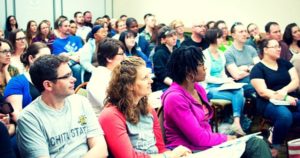West Virginia education savings accounts are worth fighting for
Editor’s note: In this commentary from West Virginia education choice activist and reimaginED guest blogger Jamie Buckland, the mother of four explains why her state’s Hope Scholarship program…

Editor’s note: In this commentary from West Virginia education choice activist and reimaginED guest blogger Jamie Buckland, the mother of four explains why her state’s Hope Scholarship program positively impacts families across West Virginia and why the lawsuit that has been filed against it must be fought.
In 2007 my husband and I decided to homeschool our eldest son. This decision brought up quite a few questions about how we would afford it.
Would I attempt to keep working to supplement our income? How would we manage on just one income if I found it too much to juggle? How would we budget for curriculum, field trips, tutoring, assessments, and more while mostly relying on one dependable income?
Looking back over the past 15 years, I clearly see how the financial limitations have been ever-present perimeters around the possibilities for my children’s opportunities. When my older two were 11 and 8, our third child was born just as the school year got underway. Online schooling was becoming more and more popular, but the reality was that we couldn’t afford outsourcing for live instruction; we aimed to make do with prerecorded tutorials, which relied on hard-to-navigate software.
After realizing it was more trouble than it was worth, we ditched that plan, and I accepted the reality of schooling around an infant’s needs. Many homeschooling giants before me had mastered these skills; surely, I could as well. And I guess that narrative is what I mostly see as I reflect. There always was this, “You chose this”, or “Pull yourself up by your bootstraps” mentality to homeschooling that prevented me from entertaining a lingering question in the back of my mind: “How hard should this be?”
We’ve been extremely fortunate that my husband’s work has afforded us increases in our school budget consistently over the years. As this happened, and we were able to afford in-person tutoring and higher-quality resources, I found a new freedom in planning more individualized education experiences for our children.
One year, my son was able to take Intro to Physics with an engineering professor as his tutor. All three of my older children have been students at a local school of the arts, where they learned guitar, ukulele, piano, and voice. My older daughter had an ER physician as her biology tutor, and the parents all helped purchase high-quality lab equipment to enhance the course. My younger daughter began trumpet lessons at age 6, something we never would have been able to afford when the older two were her age.
As I transitioned from a rookie to a veteran homeschooling parent, I naturally began helping other families consider this method of education for their children. When a family in West Virginia is weighing options, affordability is one of the largest factors to consider. So many resources are available to children enrolled in public education that it can be discouraging for a parent or child to weigh what they will miss out on against what they will gain.
Many children’s needs are best met enrolled in school, and we all want to see our public schools meeting those needs for the families who choose that route. But we also must allow for the reality that many children’s needs can’t be met by their public school, and as a state that prides itself as a place for overcomers, shouldn’t we consider ways to support committed parents pulling up their bootstraps?
This is how I see the Hope Scholarship program impacting families across West Virginia, by providing opportunities where limitations have always stood.
My youngest will be eligible to apply for the program on March 1. A few months ago, we stumbled upon a street fair in Kingsport, Tenn., while traveling to visit family. The local library had a booth where children were playing with motorized cubes that connect to one another. My son, who is just 4, listened closely as the librarian explained he needed to connect one with a motor to one with an energy source to one with wheels.
He got to work. Within a few minutes, the librarian praised him saying, “Wow! No one has made them do that before!” As it turned out, he had figured out a new configuration that had his robot rocking back and forth instead of just moving in one direction. I was intrigued!
We always try to purchase open-ended toys and games that inspire innovation and creativity in our children. I got all the information on the name of the toys and searched for them when we got in the car. To get all the pieces he would need to really make the most of it, I would need to invest more than $500! Resources like that can often be found in classroom settings, but for many homeschooling families, an investment like that just isn’t realistic.
I’m excited for the possibilities that will come as the Hope Scholarship program is launched. I firmly believe it is in West Virginia’s best interest to fight the lawsuit that has been filed and defend the law as constitutional so that more families can see how our state is investing in children.
This article originally appeared on reimaginED.



